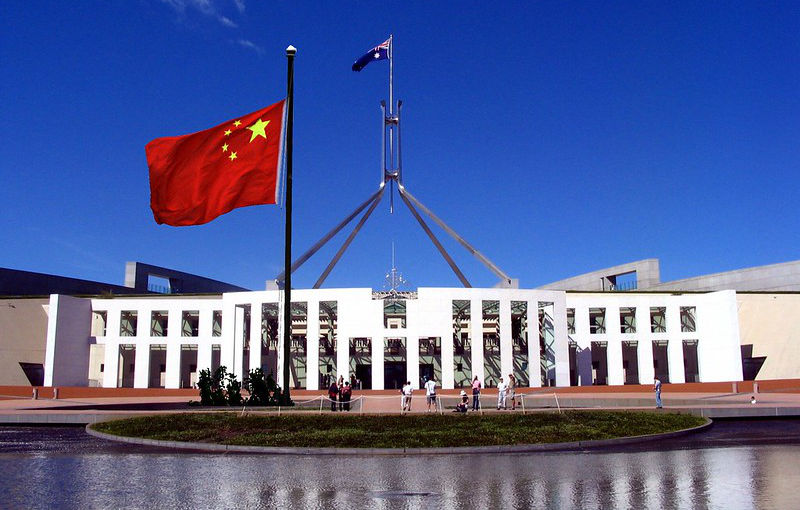Restoring the “tattered relationship” between Australia and China will take a long time. But “there is a much-increased optimism among the Chinese community” in Australia after the visit to China by Foreign Minister Penny Wong.
The recent policy and diplomatic turnaround between Australia and the Peoples Republic of China (PRC) provided a welcome boost to Australian public confidence. Thanks to a flurry of diplomatic moves taken by both sides and their open and frank discussions about all matters of national interests that the relationship appears to be on the mend.
What does it mean to our Australian Chinese community if Australia improves its relationship with China? A community that had suffered much racism, even physical abuse. This question was put to a number of Chinese community leaders, businessmen and women, educators and commentators. The responses were varied. Some were reserved, some politely declined, while others were forthright in their responses. This piece seeks to share some of their thoughts, their fears, their aspirations, and their outlook on what it means to them as Australians of Chinese heritage for Australia to have an improved relationship with the Peoples Republic of China.
15 November 2022 brought Australia-China political leaders closer together in a way never seen since 2016. This 23-minute margins meeting at the Bali, Indonesia G20 Summit Meeting, between Prime Minister Albanese and President Xi, paved the way for a number of high-level meetings. First between Defence Minister, Richard Marles with his Chinese counterpart Wei Fenghe, then a China visit by Penny Wong meeting her opposite number, foreign Minister Wang Yi. A meeting that marked the significance of the 50th anniversary of a Sino-Australian relationship initiated by Australia’s leading Labor figure, Gough Whitlam.
Described as a ‘significant step’, with ‘important changes in mood and tone’, such flurry of diplomatic activity has now reset the scene for another 50-year historic diplomatic initiative taken by an Australian Labor Prime Minister, Anthony Albanese. Perhaps ‘reimagining Australian foreign policy’ on ‘shared national interests’ and repositioning Australia in the Asia Pacific by retracing Gough Whitlam’s July 1971 visit to China amidst US concerns and constraints.
Both nations acknowledge however, that there is a long way to go still to the lifting of sanctions and to “normalisation” of relations, complicated by several recent developments including AUKUS.
What do these activities mean to some leading members of the 1.2 million Chinese Australians, many of whom felt the brunt of open racial hatred fuelled against them by conservative forces in the Morrison Dutton government, certain Think Tanks and some in our tabloid media with such lines as ‘Reds under the beds’ and ‘China Virus’?
For Chinese Australians, it was a double pandemic, it was viral and racially and ideologically driven. Today their fear lingers on, as some Chinese Australians continue to fear retributions.
Dr Anthony Pun OAM, Chair of the Chinese Community Council of Australia, and chair of Multicultural Community Council of NSW, was forthright in his response: “I believe that the Australian Chinese community had suffered significantly under the Morrison and Dutton government. The abuse and the insults and the racism against Australians of Chinese and Asian heritage was allowed unchecked causing much distress to our community living in fear throughout the pandemic. The improvements in relations”, Dr Pun concludes, “led by Prime Minister Albanese, it is hoped, will bring to an end the community suffering, the opening up of a new but hopefully prosperous chapter in Australia China relations and consequently to the wellbeing of Australians of Chinese heritage.”
Professor Jing Han, director of the Institute for Australian Chinese Arts and Culture at the Western Sydney University, echoed such sentiments and was equally forthright in her response. In a text message response, she wrote: “Firstly, the China bashing frenzy and paranoia about anything/ anybody related to China or Chinese are over, which feels that Australian/Western democracy is resumed, and life feels normal for Chinese Australians. Secondly, the current government’s effort in normalising the relationship with China, our biggest trading partner, and a country whose power is on the rise, shows true diplomacy that Australia needs in its international standing and best serves its national interests. Thirdly, a normal and constructive relationship with China will bring back collaborations with Chinese Universities and international education for Chinese students, which benefits both countries. Lastly,” she concludes, “Australia needs to understand and know more about China, not less. For Chinese Australians, we just want to be respected as any other Australians, regardless of our ethnic origins.”
Mr Zhou Xiaoping, a Melbourne based artist and curator, actively engaged with Aboriginal communities of Arnhem Land and the Kimberley, notes that “good relations are vital to people. The benefits are mutual. There is no doubt about it. It is reassuring that in such a strained relationship …… there’s still relative dialogue and good relations between people. The exchange of culture and Art, I believe, play a vital role in the development of the relationship between the two countries.”
Richard Yuan, CEO of ABC World Pty Ltd and Chairman of Entrepreneur’s Club, noted that to build a good relationship with China and the Chinese would take a long time and to restore a “tattered relationship” would take far longer. He added, however, that “I think that there is a much-increased optimism among the Chinese community with the recent visit of Foreign Minister Penny Wong….”
Former Editor in Chief of the Australian Chinese Daily, Daniel Tong said that: “Some of the Australian Chinese were verbally abused or even physically attacked during the pandemic, all because of the former Morrison government implying that China was spreading the Coronavirus”. He is however “hopeful, that China will lift the restrictions imposed on Australian products.”
This sentiment was echoed by Dr Ven Tan, The Executive chairman of the Australia China Economics, Trade and Cultural Association. He maintained that: “resetting of Sino-Australian relationship certainly comes at the right time as both nations are celebrating the 50th year of diplomatic relations. The Chinese Australian community certainly welcome the friendship as we do not want to return to tense relations that we had over the past nine years.” Finally, Dr Michael Zeng, a medical practitioner and chair of the Australian Shanwei Chinese Association said that “the Chinese community warmly welcomes the newly elected Albanese Labor government.” He added, “this, along with the improvements in relations between our two countries have caused our community to feel more confident and positive.”
Shaoquett Chaher Moselmane is an Australian politician who has been a member of the New South Wales Legislative Council since 2009 and is a member of the parliamentary Australian Labor Party until suspended in June 2020. He was assistant president of the Legislative Council from May 2019 to April 2020.

